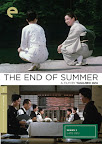
How would you feel if you are sick and your biopsy results are coming in two hours? Anxious? Depressed? Scared? Nervous? That is what Cleo is. Cléopatre Victoire is a beautiful upcoming singer in Paris. A young lady full of herself. On a beautiful evening she wanders about Paris spending her tensed two hours before knowing her fate. And as she wanders Agnes Varda shows us about life and love in her 'Cleo from 5 to 7'.
The movie opens up with Cleo in front of a tarot card reader at 5 o'clock . As she picks up the cards and the card reader explains we find that the cards show a horrific event is incumbent upon her; that may be death may be something that can change her life forever. She leaves the fortune-teller and meets her guide-cum-assistant Angele in a cafe just to be overwhelmed by the stress of the forthcoming biopsy report. But she soon manages herself and heads back home. At home she is visited by her busy lover followed by the composer and lyricist of her songs. They rehearse a song, which she finds too depressing and heads out to relieve her stress. She meets an old friend Dorothee, who poses for sculptors. She and Dorothee hang out for sometime meets a common friend Roul. They watch a movie made by Roul. Then she drops off Dorothee and goes in to a park. There she meets a witty stranger Antonio, a soldier spending his last few hours at Paris before leaving for the war. They kick off an instant friendship. Finally on the words of Antonio, Cleo pulls herself and goes to the hospital with him to meet her doctor and she meets her.
Its a movie that chronicles one and half hour of Cleo's life from 5 to 6-30 (Well the name could have been 'Cleo from 5 to 6:30' as a matter of fact). Its a faux real time movie depicting one and half hour of Cleo's life in a one and half hour time. And in this short time Agnes Varda presents to us glimpse of life and Paris simultaneously. Her style of working is what critics say, 'photojournalistic'. As we move with Cleo on the roads of Paris we discover the city. There is a bus ride of Cleo and Antonio near the end when they ride together to the hospital and its like a tour of Paris. The camera moves with Cleo on the streets of Paris, looking at the people, looking at the shops. It gives a feel of docudrama. But this is far beyond a docucrama. It rather shows the superficiality of Cleo's beautiful existence. It shows how much she craves for her celebrity status and her looks. She often directly or indirectly says that there is no point of her life if she's not beautiful. In fact this is the driving force of the entire movie, the contrast between meaningless romantic hollowness of Cleo's youth and bitterness of life as we see in the streets of Paris or of her friend Dorothee or even her own future life of uncertainty. "The tension between a superficial high-gloss beauty and a dryer and deeper grounding in life marks all of Varda’s works..." (-Molly Haskell).
Oh, and there is this sequence where Roul shows off his film to Cleo and Dorothee (by the way, Godard makes a cameo in this film). The film is about a guy who because of his dark sunglasses views the life as a very gloomy and painful; but the moment he removes his glasses he finds a bright beautiful life in front of his.
The movie marks its tone at the outset itself. The credits start rolling in with hands picking up tarot cards in color. The cards are gleaming with color but all they tell is about futility of life - Cleo's sickness, her soon-to-happen terrible things. And as we move away from the cards and start looking at faces of the characters, its all in black and white, or rather in gray. But the people Cleo meets are not pessimistic, or dull or 'gray', they are gleaming with life - vibrant, colorful life - a life more meaningful than just beautiful youth!


